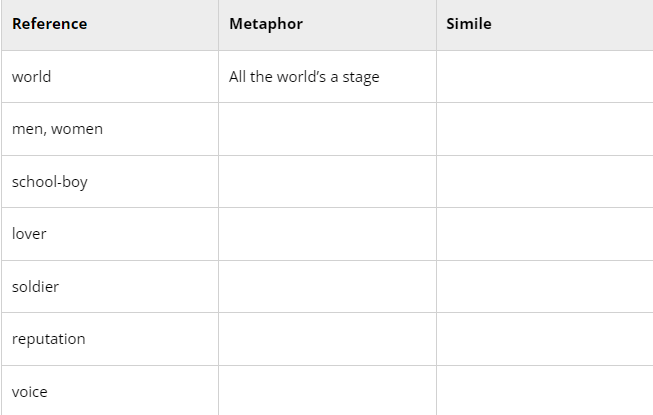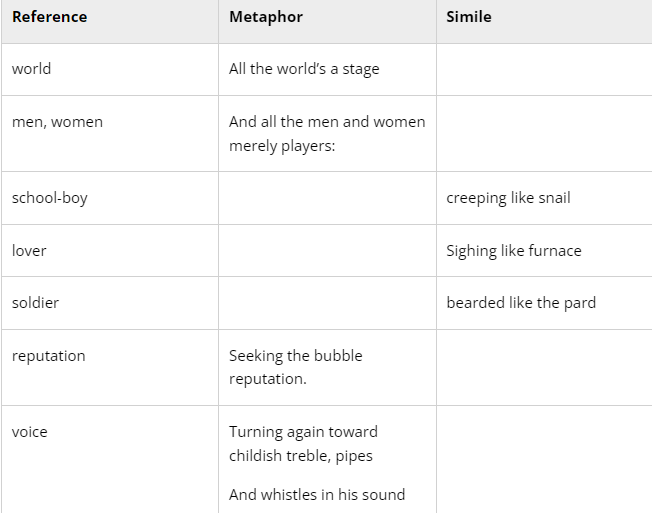NCERT Solutions for Class 9 English - The Seven Ages
Q1. On the basis of your understanding of the poem, answer the following questions by ticking the correct choice
(a) All the world’s a stage is an extended metaphor for________.
(i) the life shown in well-known plays.
(ii) seeing the well-known plays.
(iii) life of well-known actors.
(iv) life of a man that comes to an end.
Ans : (iv) life of a man that comes to an end.
All the world’s a stage is an extended metaphor for the life of a man that ultimately comes to an end. This metaphor compares life to a theatrical performance, where individuals play various roles before they exit the stage, symbolising death.
(b) All ‘have their exits and their entrances’. Exits and entrances refer to __________.
(i) death and birth
(ii) beginning and end of the play
(iii) coming and going of actors
(iv) the end of the Shakespearean era
Ans : (i) death and birth
Exits and entrances refer to birth and death. These terms symbolise the cyclical nature of human life, illustrating how every individual experiences both beginnings and endings throughout their existence.
(c) The seven roles that a man plays correspond to his __________.
(i) chronological age in life
(ii) desires
(iii) mental age in life
(iv) idea of a perfect life
Ans : (i) chronological age in life
The seven roles that a man plays correspond to his chronological age in life. These roles illustrate the physical and mental evolution from infancy through to old age, highlighting the evolution of a man's life through its various stages.
Q2. Having read this extract, identify the stages of a person’s life as Shakespeare has done. Write down these stages in your notebook, and sum up the characteristics of each stage in two or three words. e.g.
Ans :
Q3. Read the given lines and answer the questions that follow by selecting the correct option.
(a) All the world’s a stage
And all the men and women merely players:
They have their exits and their entrances;
And one man in his time plays many parts,
His acts being seven ages.
1. And one man in his time plays many parts……
Replace the underlined word with the correct option which has the same meaning as used in the given lines.
A. scenes
B. roles
C. jobs.
D. tasks.
Ans. B. roles
The phrase "plays many parts" refers to the different roles a person takes on throughout their life, representing various phases of existence.
2. The word ‘merely’ reveals that the poet regards/views human life as ________.
A. impressive
B. inconsequential
C. magnificent
D. uninspiring
Ans. B. inconsequential
The word ‘merely’ suggests that the poet views human life as inconsequential, indicating a perception of life as insignificant in the grand scheme.
3. Pick the option that does not match with the poetic device used in the phrase ‘All the world’s a stage’.
A. A thing of beauty is a joy forever.
B. The lightning was fireworks in the sky.
C. Heavy is the heart that wears the crown.
D. The movie was a roller coaster ride of emotions.
Ans. A. A thing of beauty is a joy forever.
The phrase 'All the world’s a stage' employs a metaphor, comparing life to a play. In contrast, option A, 'A thing of beauty is a joy forever', does not use this figurative comparison, making it the option that does not match.
(b) The sixth age shifts
Into the lean and slippered pantaloon,
With spectacles on nose and pouch on side,
His youthful hose, well saved, a world too wide
For his shrunk shank; and his big manly voice,
Turning again toward childish treble, pipes
And whistles in his sound.
1. The tone of the poet in line
‘His youthful hose, well saved, a world too wide
For his shrunk shank’
is largely
A. nostalgic
B. humorous
C. pessimistic
D. regretful
Ans. A. nostalgic
The tone in the line about old age is nostalgic (A). This reflects a longing for lost youth and the passage of time, highlighting the contrast between the past and present.
2. Select the option that displays the changes that very old age witnesses.
i. Round belly
ii. Full of wisdom
iii. Loss of vigour
iv. Lean & bony
v. Hoarse voice
A. i, iii, iv
B. ii, iii, v
C. ii, iii, iv
D. iii, iv, v
Ans. D. iii, iv, v
The changes that occur in very old age include a notable loss of vigour, resulting in a lean and bony physique, as well as a voice that becomes hoarse. Therefore, the correct options reflecting these changes are: iii, iv, and v (D).
Q4. You already know the two literary devices generally used by writers and poets for comparison, i.e. metaphor and simile.
e.g. a) He was a lion in the battle. (metaphor)
b) He fought like a lion. (simile)
In (a) the writer talks of the soldier in terms of a lion. The comparison is implied. In (b) the writer compares the soldier to a lion with the use of the word like, (as may also be used for such comparisons).
Read the poem again and note down the metaphors and similes. Complete the following chart.

Ans.

Q5. In this poem, life is being compared to a play. Just as in a play, a man acts many parts, so also in life, a man plays many roles. Can you think of some other comparison for life? (For example, life could be compared with the seasons in nature, the days of the week, the lessons in a school day.) Select one of these comparisons (or choose one of your own), and write about the similarities that life has with it. (80-100 words)
Ans: In the poem 'The Seven Ages' by William Shakespeare, life is compared to a play where each person takes on various roles, much like the changing seasons in nature. Spring represents infancy and childhood, a time of innocence filled with blooming flowers and playful butterflies. Summer signifies adolescence, characterised by emotional intensity and the exploration of passions. Autumn reflects adulthood, where falling leaves symbolise maturity and complex life reflections, including relationships and careers. Finally, winter embodies old age, marked by stillness and wisdom, as one seeks comfort and peace. Each season represents different stages of life's journey, from youthful beginnings to serene old age.
|
263 videos|1418 docs|124 tests
|
FAQs on NCERT Solutions for Class 9 English - The Seven Ages
| 1. What are the main stages of life discussed in "The Seven Ages"? |  |
| 2. How does Shakespeare portray the characteristics of each age in "The Seven Ages"? |  |
| 3. What is the significance of the phrase "all the world's a stage" in the poem? |  |
| 4. How does "The Seven Ages" relate to the concept of the passage of time? |  |
| 5. What themes are explored in "The Seven Ages"? |  |

















